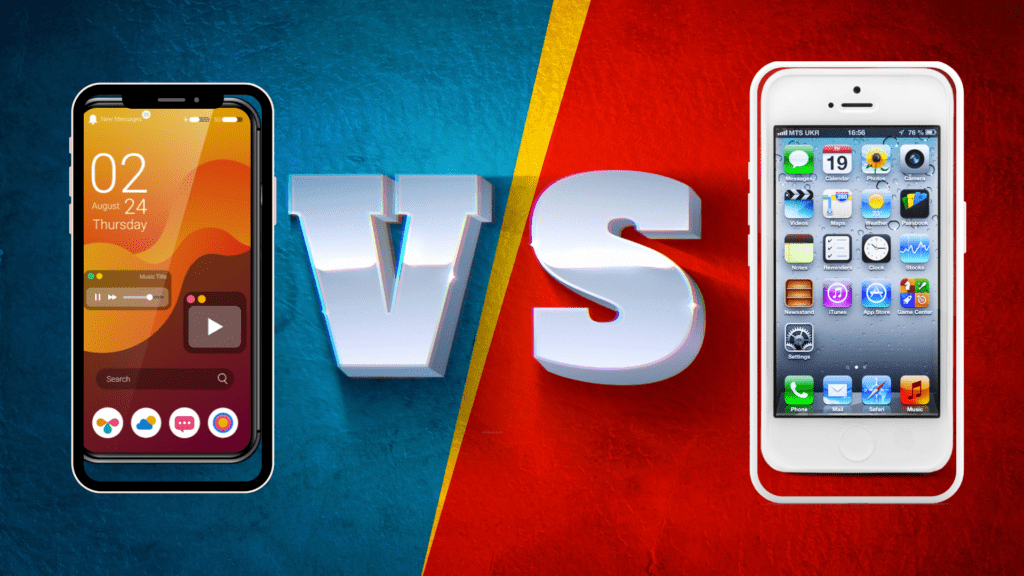iPhone vs Android: Which Phone is Best?
In the ever-evolving world of smartphones, choosing between an iPhone and an Android device is a significant decision. Both platforms offer unique features, advantages, and ecosystems that cater to different preferences and needs. This detailed comparison of iPhone vs Android will help you understand which phone might Be the best fit for you.
1. Operating System and User Experience
iPhone:
iPhones operate on Apple’s iOS Renowned for its streamlined and intuitive interface.
Regular software updates are provided ensuring a stable and consistent experience across devices.
The App Store’s stringent app review process enhances app quality and security.
Android:
Android, developed by Google, offers extensive customization options.
Users can personalize their experience through adjustable home screens, app choices, and settings.
The Google Play Store provides a Vast range of apps, though quality can vary.
2. Hardware and Design
iPhone:
Apple’s iPhones are celebrated for their premium materials and sophisticated design.
Consistent design language and attention to detail contribute to a recognizable and elegant appearance.
Though generally more expensive, iPhones are known for their durability and high-quality build.
Android:
Android phones are available in a Broad spectrum of designs and price points, catering to different budgets.
Various manufacturers, including Samsung, Google, and OnePlus, offer distinct hardware
The diversity in design allows for greater personalization and choice.
3. Performance and Speed
iPhone:
Equipped with Apple’s custom A-series processors, iPhones deliver high-performance levels.
iOS is finely tuned to work seamlessly with Apple’s hardware, resulting in a smooth user experience.
Frequent software updates contribute to maintaining high performance over time.
Android:
Performance varies among Android devices, with different processors used by various manufacturers.
High-end models often match or exceed iPhone performance, while budget models may fall short.
The performance can be influenced by the device’s hardware and software optimization.
4. Camera Quality
iPhone:
iPhones are known for their excellent camera systems, providing high-quality images and videos.
features like Night mode, Deep Fusion, and Dolby Vision HDR enhance photography and videography.
The camera software is designed to be user-friendly while delivering impressive results.
Android:
Android devices offer A diverse range of camera capabilities, from entry-level to advanced.
Flagship models from brands like Google Pixel and Samsung Galaxy are recognized for their innovative camera technologies.
Camera features vary significantly between manufacturers, with some offering multiple lenses and advanced editing tools.
5. Battery Life and Charging
iPhone:
Battery life on iPhones typically lasts a full day under normal usage conditions.
Recent models support fast charging and wireless charging, improving convenience.
Recent models support fast charging and wireless charging, improving convenience
Android:
Battery performance varies among Android devices, with high-end models generally providing better longevity.
Many Android phones support various charging technologies, including fast and wireless charging.
Features such as power-saving modes can help extend battery life.
6. Ecosystem and Integration
iPhone:
The iPhone integrates effortlessly with other Apple products like Macs, iPads, and Apple Watches.
Features such as Handoff, Continuity, and iCloud create a cohesive Ecosystem for users.
Apple’s ecosystem is designed to enhance productivity and user convenience.
Android:
Android devices work well with Google’s services and a wide range of third-party hardware.
Compatibility with smart home devices and other ecosystems offers flexibility.
Users can benefit from a broad selection of applications and devices.
7. Software Updates and Security
iPhone:
iPhones receive regular software updates Which are distributed to all supported devices at once.
Updates enhance security and introduce new features, extending the life of the device.
Apple’s controlled app environment reduces the risk of malicious software.
Android:
Software updates on Android can vary based on the manufacturer and model.
Security updates are regularly issued, but the timing may differ between devices.
Users have more control over app permissions and security settings.
8. Price and Value
iPhone:
iPhones are typically priced higher, reflecting their premium build and features.
They often retain higher resale value compared to many Android phones.
Long-term support and integration with the Apple ecosystem offer value over time.
Android:
Android phones cover a Wide range of budgets, from affordable to high-end models.
Mid-range and flagship Android devices offer excellent price-to-performance ratios.
A Broad variety of options allows users to find a device that suits their financial constraints.
9. Customization and Flexibility
iPhone:
iOS offers a more uniform and streamlined experience with limited customization options.
While it prioritizes ease of use and stability, it restricts extensive personalization
Apple’s ecosystem is designed for simplicity and consistency.
Android:
Android stands out for its high level of customization, allowing users to adjust interfaces and settings.
Options include changing launchers, icons, and themes, and using custom ROMs for advanced modifications.
This flexibility caters to users who enjoy personalizing their devices.
10. Support and Service
iPhone:
Apple provides robust support through its network of Apple Stores, online resources, and authorized service providers.
The Genius Bar offers in-person assistance and repairs.
AppleCare+ extends warranty coverage and provides additional support options.
Android:
Support varies by manufacturer, with major brands offering strong service networks.
Users can access online support and various third-party repair options.
Warranty and service plans differ among brands and models.
Conclusion
When considering iPhone vs Android, the best choice depends on your Individual needs and preferences. iPhones offer a polished, user-friendly experience with seamless integration into Apple’s ecosystem, while Android phones provide greater customization, variety, and flexibility.
Evaluate the factors that matter most to you— Whether it’s camera quality, performance, design, or ecosystem integration. By assessing these aspects you can make a well-informed decision that aligns with your lifestyle and preferences.
For more blogs visit our website – vyoming.com
visit our social media: Facebook
